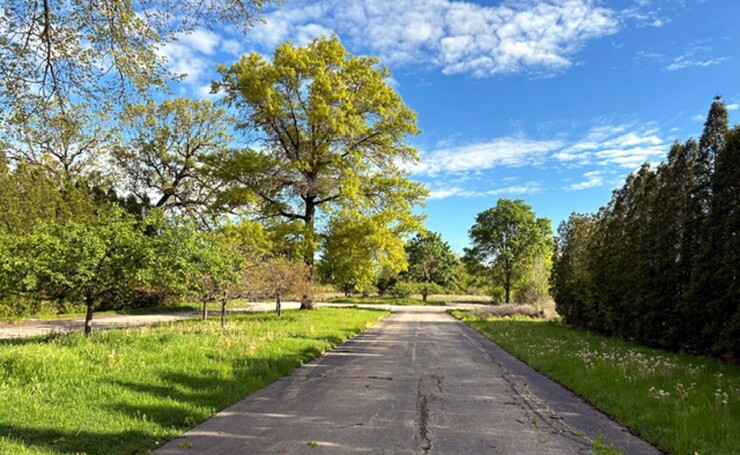Chicago's iconic lakefront is also its portal to water supplies from Lake Michigan, serving not only the city but 120 of its suburbs.
But Chicago's top suburban customer and Illinois' largest water wholesaler, the DuPage Water Commission, now says it plans to strike out on its own.
The commission revealed this week that it has bought a 127-acre former golf course in Northbrook, the Green Acres Golf Club, for $80.5 million. It plans to spend as much as $7 billion, including debt service, to build a water treatment plant and pumping station there so it can stop buying water from the city of Chicago.

Northbrook is at the northernmost tip of Cook County. It lies west of the lakeshore, but the commission has been communicating with officials in neighboring Glencoe about accessing the lake through that village.
"The site that we have acquired would be most suitable to access the lake through Glencoe," said DuPage Water Commission General Manager Paul May. "We would not need to necessarily build a structure near the shore. All the construction would be underground. So there would be no impact to the citizens of Glencoe."
DuPage County, which had a population of over 921,000 as of 2022, according to Census data, is directly west and south of Cook County. Its seat in Wheaton is 27 miles west of downtown Chicago.
The county is a separate governmental body from the DuPage Water Commission. The commission currently has no debt, but plans to issue its own bonds to finance the project, May said.
"We expect the primary funding sources will be [Water Infrastructure Finance and Innovation Act] funds and revenue bonds," he said. "For a project of this duration, we'll use working cash as well as revenue bonds as well as WIFIA funds. Maybe a state revolving loan. We'll get more detailed with the financing scenarios as the project goes forward."
May said the commission does not expect to run into any complications disentangling itself from Chicago. It recently authorized a 17-year contract extension with the city.
May said they are planning for due diligence and engineering on the Northbrook project to take four to five years and heavy construction to take 10 years.
"That leaves a two-year buffer," he said. "So we expect that that timeline will work out just right."
May did not say what triggered the commission's move, but according to a report in
A Chicago Department of Water Management spokesperson said that the city has pledged to all its suburban customers, including the DuPage Water Commission, that it will adopt across the board the cost-of-service rate approach it used for the 100-year Joliet contract.
"We look forward to continuing our discussions with the commission to achieve a long-term extension of its water supply agreement with the city," the spokesperson said. "Chicago has served DWC for decades as a reliable and affordable source of drinking water. We believe that extending the agreement with Chicago is the best option for ensuring that DWC and its customers will continue to have access to cost-effective and high-quality water."
The DuPage commission was Chicago's largest suburban customer in 2021, according to
Chicago has about $2.3 billion of water revenue bonds outstanding at the end of 2022, according to
The water revenue bonds carry underlying ratings of A-plus from S&P Global Ratings, Baa1 from Moody's Ratings, A-plus from Fitch Ratings and AA from Kroll Bond Rating Agency.
May said the next step for the DuPage commission will be to assemble a coalition of prospective water customers and other regional water wholesalers and municipalities. That might not include Northbrook, which has its own fairly new water treatment plant, but "we'd be happy to work with them if they desired to," May said.
But it might well include the Northwest Suburban Municipal Joint Action Water Agency, a consortium of Cook, DuPage and Kane County towns that buy Lake Michigan drinking water in Chicago. NSMJAWA is the second largest water wholesaler in the state.
It was Chicago's third-largest suburban customer in 2021, paying $41.66 million.
It and the DuPage Water Commission "have a mutual benefit in partnering and participating in a joint water system which could serve both agencies," May said.
Water from the proposed treatment plant in Northbrook would have to cut through about 15 miles of northern Cook County to reach DuPage.
"Both of us are along the same route to the lake," May said. "So it makes all the sense in the world for both agencies to participate in this project together."
NSMJAWA Executive Director Ramesh Kanapareddy said both agencies are currently doing a joint study on the feasibility of an alternative water supplier. The study is still in the initial stages.
"If, down the road, NSMJAWA decides to partner with DWC then, yes, NSMJAWA… will receive water from Northbrook Regional Water Plant," Kanapareddy said.
"This would be one of the most significant [water] projects in North America, and would impact future generations of suburban Chicagoans for many, many years," May said.





